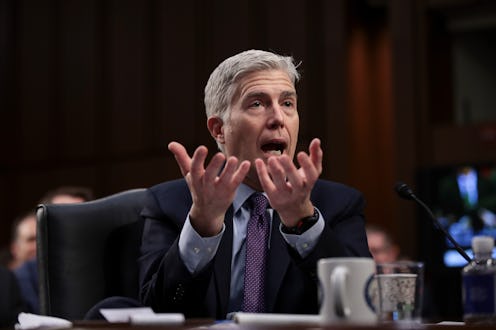News
Decoding Neil Gorsuch's Abortion Views Isn't Easy

President Trump made some pretty strong campaign promises to appeal to conservative voters, including a vow to nominate a Supreme Court justice who would overturn Roe v. Wade. Trump's pick to fill the vacancy on the bench, Neil Gorsuch, began his confirmation hearings on March 20, and as you can expect, he was extensively grilled on the topic. While he was forced to answer questions specifically pertaining to the landmark 1973 ruling that legalized abortion nationwide, Gorsuch's comments about abortion, both in the confirmation hearings and in past statements, make it difficult to know what his views on the subject really are.
Gorsuch cautiously tip-toed around the question of whether or not he would work to overturn Roe, as Trump repeatedly promised he would, by stating in his confirmation hearing that he would honor the precedent set by the ruling. But in the past, he has expressed a firm commitment to protecting the inviolability of human life by opposing assisted suicide and euthanasia.
Roe v. Wade has ensured for decades that women across the country have access to safe abortion procedures. While state-wide laws that attempt to restrict access to abortion are ubiquitous, a nation-wide repeal of Roe v. Wade would affect more than 37 million women, according to a report by the Center for Reproductive Rights.
A lot is riding on this Supreme Court pick, most notably women's fundamental right to have autonomy over their own reproductive decisions. That being said, Gorsuch's past comments on the subject will surely be subject to scrutiny. Here are a few of his most notable comments:
1We Move Forward
In his confirmation hearing, Gorsuch seemed to suggest that Roe v. Wade is a done deal and that he doesn't intend to use a seat on the SCOTUS bench to backtrack on the precedent that it established.
Once a case is settled, that adds determinacy of the law. What was once a hotly contested issue is no longer a hotly contested issue. We move forward.
2I Would Have Walked Out The Door
3No Promises
4Roe v. Wade Is A Precedent
Gorsuch continuously stated that he views Roe v. Wade as an important precedent, cemented in national law, that will be used as reference in all future rulings related to abortion.
Senator, again I would tell you that Roe v. Wade, decided in 1973, is a precedent of the United States Supreme Court. It has been reaffirmed ... it was reaffirmed in Casey in 1992 and in several other cases. So a good judge will consider it a precedent of the United States Supreme Court worthy of treatment of precedent like any other.
5I'm Not Tipping My Hand
Gorsuch was cautious in his confirmation hearings not to reveal his personal opinion on a range of controversial rulings, from abortion rights to gay marriage. He would only confirm, once again, that he is committed to following precedent.
I'm not in a position to tell you whether I personally like or dislike any precedent. That's not relevant to my job. If I were to start telling you which are my favorite precedents ... I would be tipping my hand and suggesting to litigants that I have already made up my mind about their cases.
6Human Life Is Inherently Valuable
Despite the polished and carefully constructed answers Gorsuch gave in his confirmation hearing, his book,The Future Of Assisted Suicide and Euthanasia, provides insight into Gorsuch's views on whether or not it is ever acceptable to end a human life, even in extreme circumstances. While his book focuses specifically on euthanasia, his philosophies reveal a lot about how Gorsuch may apply the same logic to abortion rights cases.
Human life is fundamentally and inherently valuable, and the taking of human life by private persons is always wrong.
(Note the always.)
7Abortion Rights Dependent On Definition Of Human Life
Also in his book, Gorsuch analyzes whether or not abortions violate the dignity of human life, but was still careful not to reveal his own personal opinion. In one chapter of the book, he provides a standard for determining the ethicality of abortions.
Abortion would be ruled out by the inviolability-of-life principle I set forth if, but only if, a fetus is considered a human life.
He wrote that under the current precedent established by Roe v. Wade, "a fetus is not a person," but in a footnote later in the book, Gorsuch also presents a contrary view provided by a mentor of his, Justice Byron R. White.
The right to terminate a pregnancy differs from the right to use contraceptives because the former involves the death of a person while the latter does not.
Gorsuch does not explain his own view on the topic, but knowing the standard he is using to determine a woman's right to abortion is telling.
8Protect Religious Beliefs
In 2013, Gorsuch ruled in favor of Hobby Lobby's right to deny providing certain types of contraceptives to employees through insurance coverage on the basis of protecting the company's "religious beliefs."
The ACA’s mandate requires [Hobby Lobby] to violate their religious faith by forcing them to lend an impermissible degree of assistance to conduct their religion teaches to be gravely wrong.
This logic used in this ruling could, potentially, be used to restrict access to abortion because it is strongly opposed by many religious organizations.
With more confirmation hearings ahead, we can be sure that Gorsuch will continue to be asked about his stance on abortion and, specifically, whether or not he plans to overturn Roe v. Wade. These quotes offer a good starting point for attempting to analyze what Gorsuch's personal views on the subject are — although that still isn't entirely clear.